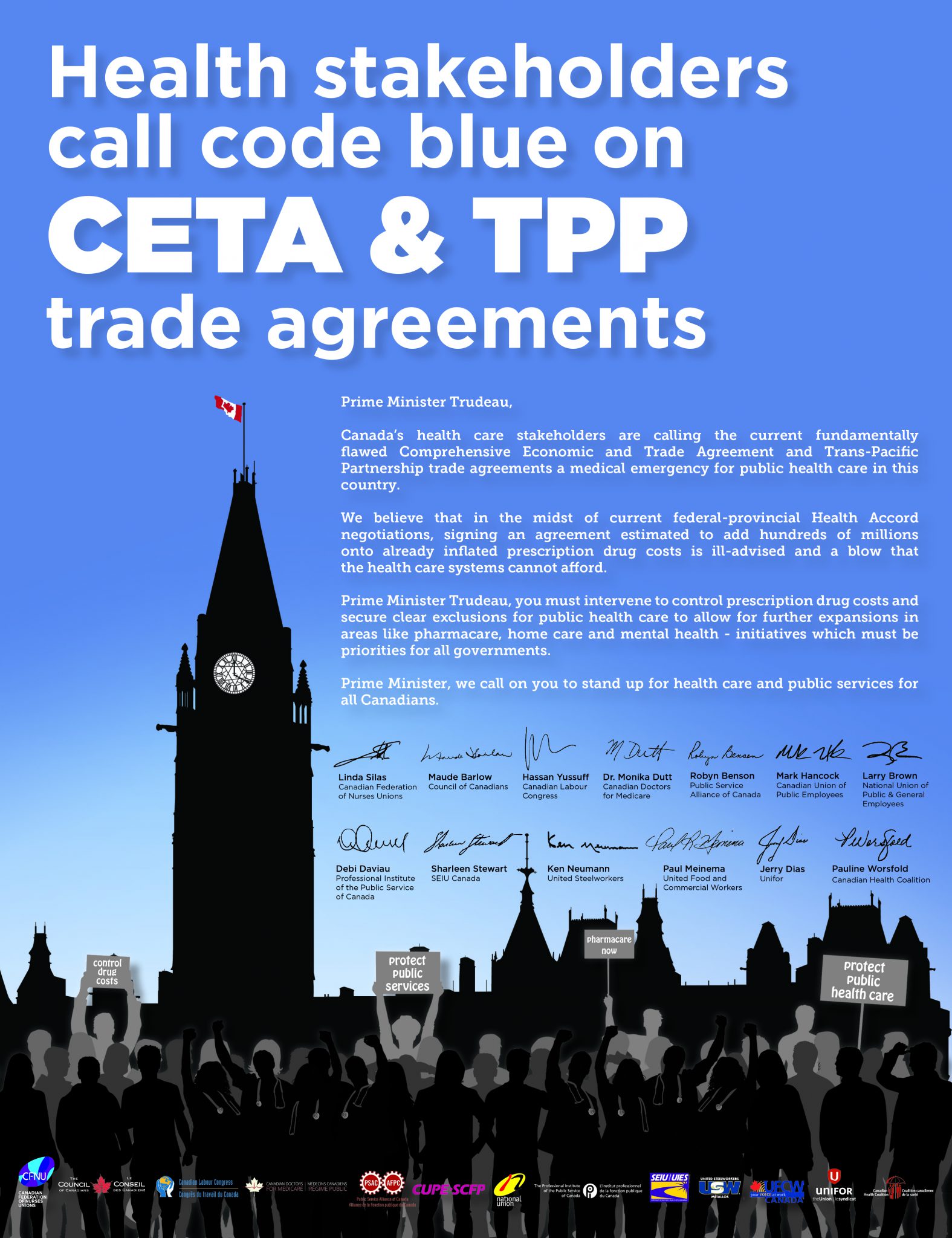Dear Prime Minister Trudeau,
I am writing to you on a matter of urgent importance. Earlier this year, on behalf of Canada’s nurses, I sent a letter to Minister Freeland with our concerns regarding the Trans‑Pacific Partnership (TPP) and provided research regarding the TPP’s negative impact to our health care system. These include adding an estimated $636 million more per year to prescription drug costs through ill-advised expansion of intellectual property rights benefiting pharmaceutical companies. To date the Canadian Federation of Nurses Unions (CFNU) and the almost 200,000 nurses that I represent have not received a satisfactory response to our concerns.
Recent developments in the Comprehensive Economic and Trade Agreement (CETA) negotiations force Canada’s nurses to again register our strong opposition to the TPP and CETA. Both these agreements increase costs for public health care, impede innovation and expansion, as well as expose governments to future litigation and massive compensatory awards by private corporations. Prime Minister, this is a serious matter requiring your attention and one that will severely impact our provincial and territorial health care systems.
Prime Minister, Canada’s nurses are asking you to personally intervene to secure clear exclusions for public health care in these treaties. This includes allowing for future expansion of public health care into areas such as pharmacare, home care and mental health services, initiatives which are priorities for all governments. We believe that this is one of the key red lines that Canada must adopt before signing any agreements.
Canada’s nurses believe securing a health care exemption is achievable, given that all the 28 European Union countries have robust public health care systems and pharmacare programs which control costs and provide better access for their citizens. The EU governments would not have any legitimacy to deny explicit carve-outs for Canadian health care, but these need to be requested by Canada in order to be granted.
We believe that in the midst of the current federal-provincial Health Accord negotiations, signing an agreement estimated to add hundreds of millions onto already inflated prescription drug costs is ill-advised and a blow that the health care system should not suffer. Our concerns go beyond health care, but without addressing the impacts on health care, we believe this trade deal is irredeemable and would represent a major step backwards for all Canadian public services.
Prime Minister, I also want to address the recent Joint Interpretative Declaration on the Comprehensive Economic and Trade Agreement. While this declaration claims to address and amend certain parts of the agreement that have been criticized in Europe and Canada, unfortunately this interpretive declaration lacks substance and does not address the critical concerns raised by labour and other stakeholders. The vagueness of the document makes it useless in any future legal proceedings or arbitrations. We cannot allow the future of our public health care system to be left vulnerable in the future because clear commitments were not secured in advance within these treaties.
Prime Minister, we are calling on you to not allow a flawed trade agreement negotiated by the previous federal government to damage health care in Canada. We believe that leaving our health care system and public services unprotected in these trade agreements is dangerous and cannot be deemed progressive. Canada’s nurses call on you to stand up for health care.
Yours sincerely,
Linda Silas, President
Canadian Federation of Nurses Unions
Cc.: The Hon. Chrystia Freeland, Minister of International Trade
The Hon. Jane Philpott, Minister of Health
